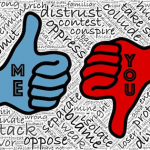
Note: This conversation happened on Saturday morning, during which the Women’s March on Washington and sister marches across the US and the world were also occurring. (Estimates of attendance vary, but there were likely millions of Americans out in protest.) In anticipation of those events, we decided to discuss the idea of resistance.
Hind Makki (Muslim blogger at Hindtrospectives): One of my major questions is: how to keep on resisting without burning out?
Galen Broaddus (atheist blogger at Across Rivers Wide): This is a huge fear of mine because these marches are attempting to mobilize a lot of people, the vast majority of whom will have to go back to their normal lives of not constantly resisting at some point. The people who will keep fighting will end up shouldering a lot of the burden.
Which is all the more reason to support organizations doing that work as much as we’re able.
Andy Gill (progressive Christian blogger at Andy Gill): Yeah, I mean, it’s exhausting just watching all that’s going on, scanning through my Facebook feed, shoot, even the energy it takes to resist commenting or responding to certain posts from family and/or friends… (In my line of work they call this “sensory overload” – lol.)
Galen: Sensory overload is a good comparison because what we’re dealing with here is literally a challenge to our typical cognitive capacities. We’re being overloaded with misinformation (or sometimes outright disinformation) and a barrage of challenges to democratic norms, and it’s difficult to take in.
Hind: It’s definitely sensory overload. I think it’s critical that doesn’t bleed into “empathy overload.” We need to cultivate and protect our capacity for caring about the Why of our resistance, even as we inevitably debate and go back and forth over the How of our resistance.
Andy: What is the “why” behind either of your means of resisting?
And, for me, it’s definitely a huge question as to how one keeps this sensory type of overload from bleeding into empathy overload…?
Hind: The Why for me is manifold: 1) I believe in the full, and Divinely-given dignity of each and every human being. 2) I believe God asks me to do my part to respect and maintain my own dignity and the dignity of others. 3) I believe Americans have a bond based on the idea that we must all be equal under the law and when we see that to not be the case, we must work together to form a more perfect union.
What are your Whys?
Andy: Hm… Humanity, mattering. Experientially, for me it’s the resistance of whatever makes others feel small. Because nobody likes or wants to be made to feel that way. I think within the political world these come out to be issues of civil rights, fair treatment and equality.
Galen: I find myself very much in agreement: This fight is fundamentally about equality, but I think that also entails the full inclusion of marginalized peoples, and this administration represents an overt threat to that inclusion.
Hind: I’ve been thinking about Dr. King’s quote that “the moral arc of the universe is long, but it bends toward justice.” I think we can’t sleep on the progresses of the civil rights movements.
Andy: No, especially not right now – I also want to say that, I think for the marginalized (which in my opinion are 99.9% of us) we don’t have the time or luxury of division.
But, here’s my question for both of you: What’re your thoughts on violent resistance, as we’re seeing all of these Facebook videos pop up of either violence against protestors and/or violence inflicted upon “white supremacists”?
Hind: I think in large protests, organizers (if there are any) can’t control everyone. I definitely don’t condone violence, or burning cars, or breaking windows, and such any of that, but I do have to raise my eyebrows at people who are more upset at a broken window than they are at the loss of health care and civil liberties.
Andy: Hind, for sure, regarding health care and civil liberties – and I think that, the issue that comes to play is that it’s very nuanced in regards to loss of health care and when we throw in the fact that Obama’s administration deported more people than any other…
Hind: Yes, I’m worried that people will either lionize the Obama legacy (which included drones and deportations), or blame him personally for the new administration. We must be able to look at the Obama presidency with nuance and clear eyes, as we try to protect our rights and our health care.
Andy: A lot of the media, I feel, is a means to play up and on our emotions (because like us here on Patheos, they too need traffic to stay up and running). As mentioned, fake news is nothing new; this play upon our emotions creating this visceral sense of urgency, it’s a old trick in the playbook… (Am I wrong on this?)
Galen: I get that caution – you can get people to act quite irrationally if you convince them of imminent peril – but I’m not sure the urgency is unjustified here.
This is where all of this gets complicated for me. A lot of people (specifically people who have not taken a hard line against Trump) have been saying that maybe things won’t be that bad and that we should give Trump a chance to lead. But how long do we have to go before we recognize Trump for who he has said he is, and at what point will things be too far gone for resistance to be effective? No one wants to take that risk, and some people feel like violence may even be necessary. I tend to agree with Hind in not condoning this violence, but it’s difficult to suggest that violence hasn’t been a part of past resistance movements. So I don’t know.
Hind: Oh no, I understood what Trump is about the moment he led the Birther movement. And later when he started his campaign denigrating Mexican immigrants, that was underscored. I saw his character when he mocked a man living with disabilities on live TV. I don’t think he was lying in the Access Hollywood video. For the life of me, I can’t understand the people who say he is not who he himself says he is. I believe him when he says who he is, and I resist that.
Andy: Do you believe or feel that there are in fact things going on behind the curtains in which he uses these outlandish statements as a means to divert attention from?
Hind: Probably. And that’s why we must remain vigilant and not be distracted. Because focusing on the distractions will burn us out.
Andy: Yeah, I mean I think that this is one of the tactics they’re rolling with: get ’em emotional, push ’em to their limits, they’ll burn out, invert and turn against, becoming reactive and then… they swiftly step in and do more terrible shit…
Hind: Yes, I think that to resist, we must have correct information. I hope that the media will practice their own resistance and work to keep the new government as transparent as possible.
How will both of you help the resisters around you not burn out? My friends and I are giving each other space to vent and “escape from reality” once in a while. It can’t all be organizing all the time.
Galen: Absolutely. Self-care is incredibly necessary for activists of any kind, and we should be doing what we can to promote (and certainly not shame) those ways in which we can recharge ourselves for the fights.
Andy: **conviction** I’m not doing too much to combat this burnout; it’s definitely something I need to think on as I feel like it’s just providing safe space to speak and feel openly free of judgement. It’s all a balance, maybe.
Galen: I also think it’s good to reiterate what I said when we were looking toward 2017: No one is in this alone. I wrote a while back about how the best metaphor for real, substantive change is not a sledgehammer but a chisel. Marches and other demonstrations are meant to be shows of force, but they won’t be the change itself, only the catalyst. We have to keep chipping away to make progress — even just making up for lost ground — but if we can get more people doing that work, then we can all help shoulder the burden rather than pushing it on professional activists only.
Or, as Jill Filipovic said on Twitter:
https://twitter.com/JillFilipovic/status/822843666502823936
Hind: One of the most important things that sustains me in this resistance movement is that I am not alone. I was in the hall at President Obama’s farewell speech and the roar of the 20,000+ crowd when he said he rejects discrimination against Muslims still rings in my ears. I see photos of dads with their daughters at the Women’s March. I’ve been connecting with Americans from across the spectrum; organizing with, and being inspired by, people I otherwise would never have had the opportunity to meet. That sustains me. The Why for me has always been the people, our neighbors and friends and fellow citizens. And that is more than enough to sustain me.
Image by Tyler Merbler via Foter.com (CC BY 2.0)










